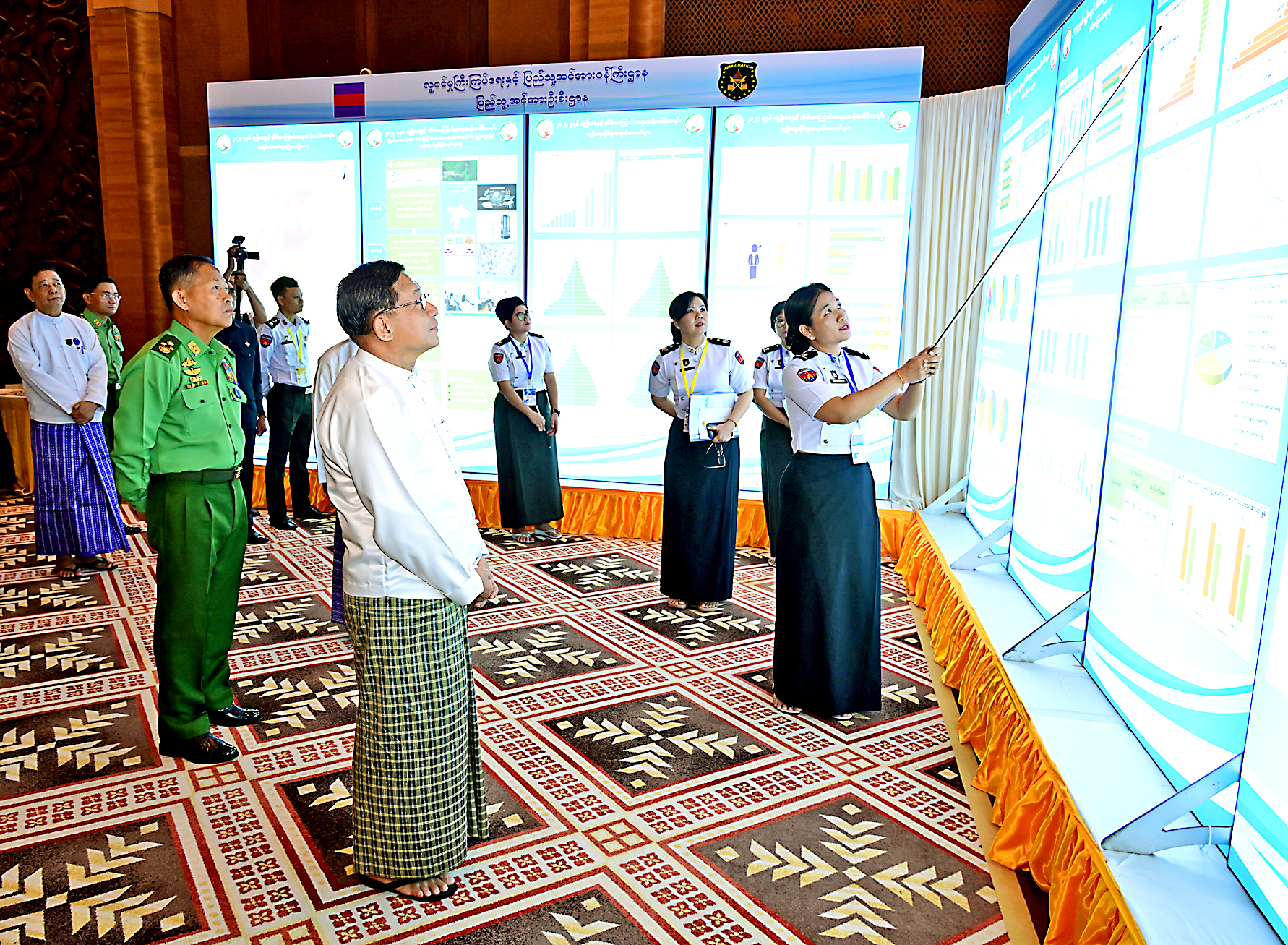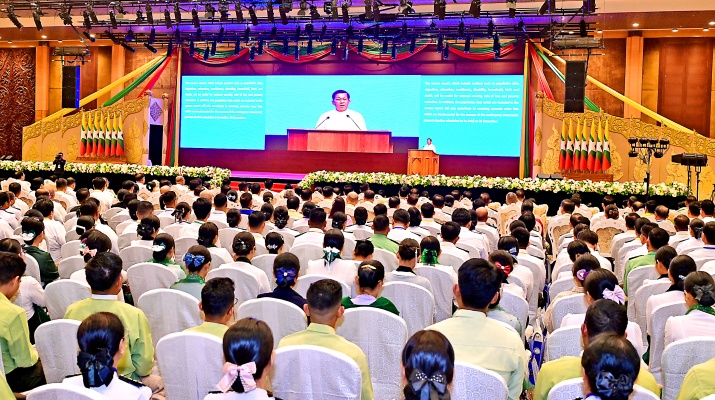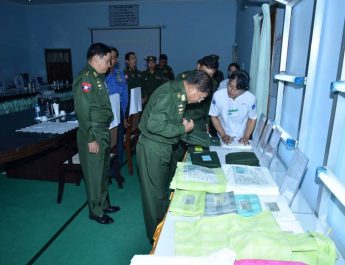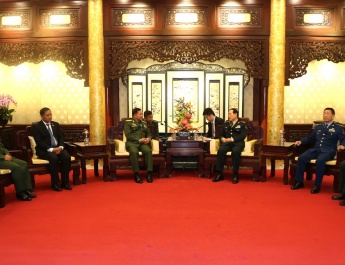Nay Pyi Taw October 27
A ceremony to release the Union report on population and household census 2024 was held at the Myanmar International Convention Centre 1 (MICC I) in Nay Pyi Taw this morning, with an address by Acting President of the Republic of the Union of Myanmar, Chairman of the State Security and Peace Commission, Senior General Min Aung Hlaing.
Also, present at the ceremony were Commission Vice-Chairman Vice-Senior General Soe Win, Commission member and Prime Minister U Nyo Saw, Commission Secretary and Joint Executive Chief General Ye Win Oo, commission members, Union ministers, Union-level dignitaries, the Nay Pyi Taw Council Chairman, region and state chief ministers, senior military officers from the Office of the Commander-in-Chief, deputy ministers, officials from the foreign embassies and international organizations, chairmen and officials from the political parties and associations, State service personnel who participated in the enumeration of the 2024 population and household census process, departmental personnel, guests, students and officials.
The choral dance troupes from the Fine Arts Department under the Ministry of Religious Affairs and Culture performed the song entitled “Enumerating the census while serving the State interests”.
Speaking on the occasion, the Senior General said that the release of the 2024 Union Report on Population and Housing Census today marks a meaningful and significant day for the nation, as it provides valuable statistical data and information for the country. The report presents the current demographic changes in the nation, including the population distribution between urban and rural areas, the educational attainment of citizens, the condition and composition of the labour force and employment, migration patterns, and lifestyles that reflect the daily lives of the people of Myanmar and shed light on the country’s future. The statistical data contained in this report reflect the present situation of the nation and serve as a mirror that indicates what conditions may arise in the future, making it a vital reflection of the state of the country.
Reviewing the history of Myanmar’s population census reveals that before independence, eight censuses were conducted between 1872 and 1941. After gaining independence, national population censuses were carried out in 1973, 1983, and 2014, and with the current 2024 census, a total of four national censuses have been conducted since independence. It can be said that a country without reliable data is like a ship sailing without a magnetic compass. Therefore, a census can be regarded as the magnetic compass that guides a nation along its path of development. Moreover, the census serves as one of the fundamental pillars for the administration and development of a country. For planners and policymakers, census data are essential to effectively implement programmes such as improving educational prospects, enhancing healthcare services, creating employment opportunities, and expanding social welfare activities. Hence, census in-formation can be described as the lifeblood of a nation that values reliability and sound planning.
The population census is an extensive and large-scale operation that not only involves massive workloads but also requires substantial financial resources. However, obtaining accurate and reliable demo-graphic data is essential for assessing the nation’s current situation and planning its future development. According to the recommendations of the United Nations and in line with international practices, it is necessary to conduct a population census every ten years. Therefore, despite various difficulties and challenges, efforts were made to ensure that the census was conducted without fail.
After the population census was conducted in October 2024, a preliminary population report was released on 31 December 2024, to provide basic data that could be immediately utilized for national planning purposes. Today, the Union Report — the main census report containing analyzed data and statistical indicators — along with a summary report and data tables designed for easy reference by users, will be officially released. These reports include information on population characteristics, migration, education, the labour force, disability, housing conditions, as well as births and deaths. The findings are expected to bring many benefits to the country and will also serve as valuable data for national security, rule of law, and poverty reduction programmes.
Furthermore, the population figures from the current census are also contributing to ensuring the completeness and accuracy of the voter lists, which form the essential foundation for the successful holding of the up-coming multi-party democratic general election to be held on 28 December. By identifying the population according to educational attainment, occupation, and living conditions through the census, the data will provide a basis for formulating and implementing relevant policies and programmes. It will also help in planning and developing the required labour force through appropriate training. In addition, the census data will serve as a fundamental reference for estimating annual enrolment projections for universities and vocational institutions based on labour demands from public, private, and local and foreign investment enterprises. It will also enable the planning and organization of necessary skill enhancement and capacity-building training programmes for workers who need to improve or up-grade their professional competencies in the current job market.
Furthermore, by connecting data on education and the labor force, and subsequently expanding the opening of vocational training schools, they can both cultivate a skilled labor force and create employment opportunities. Similarly, this approach will provide necessary data for carrying out matters related to social security, elderly care, and the registration and support of people with disabilities.
He stated that the completeness of a nation’s demographic statistics indirectly indicates its development, the quality of its governance, and its political stability, and that the census provides the essential data needed as a foundation for the proportionate development of the country’s social, economic, and administrative sectors. Furthermore, he emphasized that only the census can supply data down to the smallest administrative area.
He stated that the findings of the census simultaneously indicate the nation’s opportunities and the responsibilities that must be addressed, noting that despite Myanmar’s geopolitical importance, its population density is significantly lower than that of neighboring countries. The 2024 census data revealed that the nation’s population has slightly decreased for the first time in decades. He regarded this as both a challenge and an opportunity, attributing the change to a declining birth rate, increased migration, and evolving family structures.
He remarked that international migration is contingent upon the country’s socio-economic conditions, political stability, domestic job opportunities, and the economic development of neighboring countries, necessitating the formulation and implementation of plans to manage it with a focus on long-term national development. Although emigration among Myanmar’s youth is high, he stated that the past high birth rate has resulted in a continued large number of working-age young people, indicating that the country is still experiencing a “Demographic Bonus.” Therefore, he stressed the importance of managing these young people to ensure they are effectively and beneficially engaged in national development efforts before the period of the demographic bonus ends.
In most countries in the world, youths are cultivated and when opportunities and hopes are created for them, it can be seen that they have become a driving force for the development of the country. By investing in youths, the country will be able to grasp the benefits of the future population reward. If they are neglected, stability will decrease with the demo-graphic burden and in the worst-case scenario, this may lead to the demographic disaster.
Therefore, population policies that are aligned with the country must be adopted and measures must be taken by taking a future generation into consideration so that the country has an appropriate population that is suitable for land resources, water resources and natural resources. It is impossible to get clean water immediately after you have dug a well.
As the population and house-hold census 2024 was success-fully conducted by relying on domestic forces without any foreign assistance, it is an achievement of a national process that the country can be proud of. Today’s ceremony to release the union population census report amounts to an achievement and a historical landmark in the world, which is made possible through the concerted efforts of citizens.
As I said before, it is important to use the population census report 2024 beneficially as a roadmap for the development of the country. Efforts must be made for the socioeconomic development by analyzing the data in the report. In doing so, everyone is urged to create opportunities and hopes by taking measures for higher qualifications of youths, to conduct strong occupational trainings by adjusting education and labour market demands, to try to prepare our workforces for the technology-driven future, to help establish social protect-ion systems for the elderly, the disable and vulnerable groups, to manage migration beneficially by creating sustainable high-quality jobs in the country, to administer the beneficial utilization of land, water and natural resources in line with the demographic composition of the country and to enhance education standards by regarding all children in classrooms of today as intellectuals and intelligentsia who will shoulder and shape the future of the country.

In conclusion, the Senior General announced that the population and household census 2024 was proudly released to enable policy makers and planners can use the census results beneficially.
Then, Chairman of the census commission Union Minister for Immigration and Population U Myint Kyaing made a brief reports on results of the population census and a documentary video depicting the process of conducting a population census titled “2024 Population Census that Reflects the Image of Myanmar,” was screened.
Afterward, Myawady Band and dance troupes under the command of the Directorate of Public Relations and Psychological Warfare entertained the participants with a song titled “Moving Forward to Achieve Our Goals in the Interests of the Country,” while dance troupes from Myanmar Radio and Television of the Ministry of Information and Fine Arts Department of the Ministry of Religious Affairs and Culture performed “Let Us Enjoy Peace, Golden Land Myanmar” song and “Auspicious Victory” song respectively.
Then, the Senior General posed for documentary photo-graphs together with attendees.
Afterward, the Senior General and attendees observed the exhibits displayed in exhibition booths marking the release
of the Population and House-hold Census 2024 report attentively.






